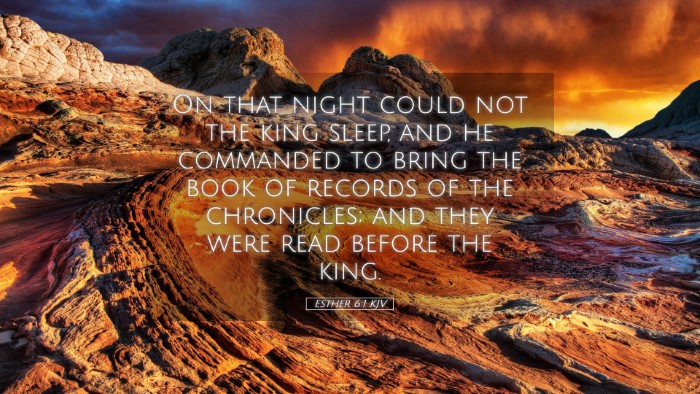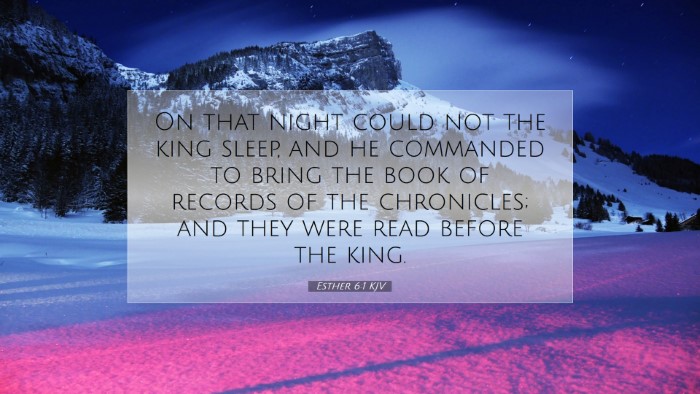Old Testament
Genesis Exodus Leviticus Numbers Deuteronomy Joshua Judges Ruth 1 Samuel 2 Samuel 1 Kings 2 Kings 1 Chronicles 2 Chronicles Ezra Nehemiah Esther Job Psalms Proverbs Ecclesiastes Song of Solomon Isaiah Jeremiah Lamentations Ezekiel Daniel Hosea Joel Amos Obadiah Jonah Micah Nahum Habakkuk Zephaniah Haggai Zechariah MalachiEsther 6:1
Esther 6:1 KJV
On that night could not the king sleep, and he commanded to bring the book of records of the chronicles; and they were read before the king.
Esther 6:1 Bible Commentary
Commentary on Esther 6:1
Esther 6:1 states, "On that night could not the king sleep, and he commanded to bring the book of records of the chronicles; and they were read before the king." This verse serves as a powerful pivot in the narrative of the Book of Esther, showcasing a divine orchestration of events that culminate in the deliverance of the Jewish people. Below, we explore insights from various public domain commentaries to enhance our understanding of this pivotal moment.
Introduction to the Text
The context of Esther 6:1 is vital for comprehending its significance. This verse occurs during a critical moment for both Esther and her people. King Xerxes is troubled and unable to sleep, a state that sets the stage for a divine reversal.
Commentary Insights
Matthew Henry's Commentary
Matthew Henry emphasizes the theme of divine providence. He notes that the king's sleepless night is not mere coincidental circadian unrest, but rather a significant act of God. He writes:
“God sometimes brings the minds of men into a restless frame, and makes them uneasy as part of His providential ordering of events. The sleeplessness of the king is orchestrated by God to fulfill His purpose.”
This sleepless night leads the king to recall the service of Mordecai, highlighting how God uses even our disquiet to accomplish His will.
Albert Barnes' Notes on the Bible
Albert Barnes provides a detailed analysis of the significance of the "book of records." He posits that the king’s command to read these records signifies the importance of historical memory and recognition of past deeds:
“The chronicles serve not only as a record of past events but as a judicial tool through which the king can discern loyalty and service. In this moment, the king’s heart is directed towards justice.”
Barnes further argues that the reading of these records reveals the providence of God, marshaling the events for the deliverance of His people through Mordecai’s earlier act of loyalty.
Adam Clarke's Commentary
Adam Clarke adds another layer of understanding by focusing on the characteristics of the king’s insomnia. He remarks on how it reflects both his personal instability and the vulnerability of his reign:
“The king’s sleeplessness suggests a greater unease within the seat of power. His request for the chronicles underscores a desire for reassurance in governance, revealing both the king's character and the sovereign workings of God.”
Clarke identifies that God utilizes the king's restlessness to set in motion a series of events leading to significant outcomes both for Mordecai and the people of God.
Theological Implications
From the combined insights of these commentaries, several theological implications arise:
- Providence of God: The sleepless night of King Xerxes demonstrates God's sovereign control over all events, including the inclination and decisions of powerful leaders.
- Memory and Justice: The act of reading the chronicles emphasizes the importance of remembrance in biblical faith, an assurance that no act of service goes unnoticed.
- Human Vulnerability: The king's inability to sleep serves as a reminder that those in positions of authority are susceptible to stress and instability, highlighting the need for reliance on divine guidance.
Practical Applications
For pastors, students, and theologians, Esther 6:1 holds several practical applications:
- Encouragement in Trials: Just as Esther faced peril, believers can be heartened that God's providential hand is at work, often in ways unseen and through seemingly mundane experiences.
- The Importance of Remembrance: Community traditions and the remembering of past events can serve to strengthen faith and part of corporate worship, affirming God’s faithfulness.
- Prayer for Leaders: Understanding the human vulnerabilities of leaders calls for prayer, as only God can guide them toward just actions aligned with His will.
Conclusion
Esther 6:1 encapsulates a profound moment of divine intervention, portrayed through the king’s sleeplessness and the reading of the chronicles. Insights from public domain commentaries reveal the rich layers of meaning within this text, emphasizing God's providence, the importance of memory, and offering practical applications for personal faith and community worship.
As we reflect on this verse, may we be reminded of God's continuous work in our lives, often manifested in the small events that seem trivial but are part of His grand narrative of redemption.


